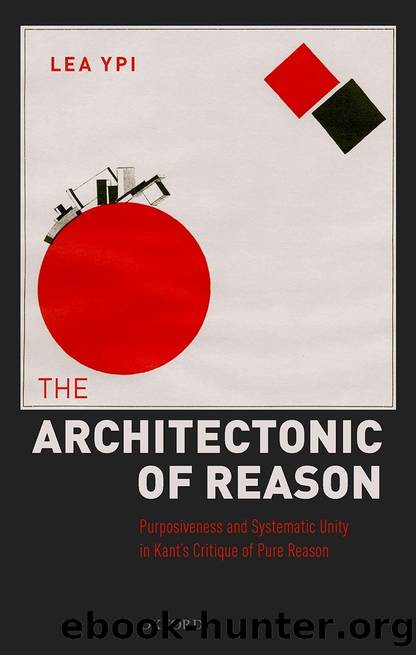The Architectonic of Reason by Lea Ypi;

Author:Lea Ypi; [Ypi, Lea]
Language: eng
Format: epub
ISBN: 9780191065422
Publisher: OUP Premium
Published: 2021-08-27T00:00:00+00:00
6. Logical and Transcendental Principles
What kind of principle then grounds the hypothetical use of reason? It is interesting to note how Kant barely mentions it explicitly, with the exception of the concluding paragraphs of the Doctrine of Elements, when he introduces the idea of a Final end of the natural dialectic of human reason. Kantâs caution here reveals the complexity of the problem he is trying to solve: an issue that looms in the background of the systematic task of the Architectonic and of the unity of theoretical and practical reason. The basis for the systematic principle of the hypothetical use of reason is a universal that is problematically accepted, a âprojectedâ unity which helps to find âa principle (Principium) for the manifold and particular uses of the understanding thereby guiding it even in those cases that are not given and making it coherently connectedâ (KrV, A 647, 675; 593).
Kant explains here that the hypothetical use of reason has no constitutive validity; it is not such that the truth of the universal rule assumed as hypothesis necessarily follows (KrV, A 647, B 675; 592). In this sense, the principle of systematic unity required is merely a logical principle necessary to help ideas proceed where the understanding is stuck, i.e., when systematically connecting the manifold of its rules âunder one principleâ. The logical idea of complete unity of cognitions is necessary because the categories of the understanding leave entirely indeterminate how to think coherently about the unity of its rules, and because the latter are essential to think coherently about experience in its complexity, including its contingent complexity.
Kant also explains that such a logical principle of the systematic unity of experience should not be confused with a transcendental principle. The former is subjective and methodological, the latter is objective and ontological. Indeed, as Kant argues, if we say that âthe constitution of objects or the nature of the understanding that cognizes them as such are in themselves determined to systematic unityâ and if we say that one could âpostulate this a priori without taking into account such an interest of reason, and therefore say possible cognitions of the understanding (including empirical ones) have the unity of reason, and stand under common principles from which they could be derived despite their varietyâ, this would entail âa transcendental principle of reasonâ. A transcendental principle, unlike a logical one, would make systematic unity ânot merely something subjectively and logically necessary, as method, but objectively necessaryâ (KrV, A 648; B 676; 593).
On a superficial reading, Kantâs distinction between subjective and objective necessity for systematicity suggests a rather dismissive take on the value and plausibility of transcendental principles for the systematic unity of experience. However, Kantâs position here is more nuanced. Interpreters who read these pages as either anticipating the third Critique or adding very little to the methodological discussion of the role of ideas based on logical principles both miss the mark. As is well known, in the Critique of Judgment a transcendental principle of purposiveness is at the heart of the search for systematic unity also from a logical point of view.
Download
This site does not store any files on its server. We only index and link to content provided by other sites. Please contact the content providers to delete copyright contents if any and email us, we'll remove relevant links or contents immediately.
The remains of the day by Kazuo Ishiguro(9000)
Tools of Titans by Timothy Ferriss(8396)
Giovanni's Room by James Baldwin(7347)
The Black Swan by Nassim Nicholas Taleb(7130)
Inner Engineering: A Yogi's Guide to Joy by Sadhguru(6796)
The Way of Zen by Alan W. Watts(6614)
The Power of Now: A Guide to Spiritual Enlightenment by Eckhart Tolle(5784)
Asking the Right Questions: A Guide to Critical Thinking by M. Neil Browne & Stuart M. Keeley(5775)
The Six Wives Of Henry VIII (WOMEN IN HISTORY) by Fraser Antonia(5515)
Astrophysics for People in a Hurry by Neil DeGrasse Tyson(5190)
Housekeeping by Marilynne Robinson(4449)
12 Rules for Life by Jordan B. Peterson(4305)
Ikigai by Héctor García & Francesc Miralles(4275)
Double Down (Diary of a Wimpy Kid Book 11) by Jeff Kinney(4273)
The Ethical Slut by Janet W. Hardy(4256)
Skin in the Game by Nassim Nicholas Taleb(4250)
The Art of Happiness by The Dalai Lama(4130)
Skin in the Game: Hidden Asymmetries in Daily Life by Nassim Nicholas Taleb(4007)
Walking by Henry David Thoreau(3963)
